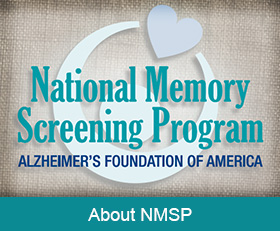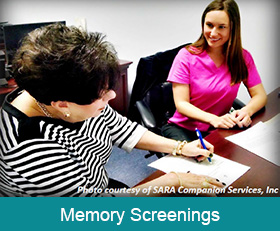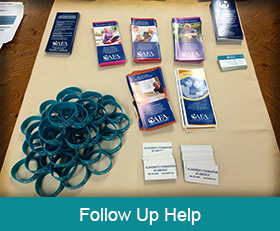About NMSP
Purpose
National Memory Screening Program provides free, confidential memory screenings to individuals concerned about memory loss with the objective of early detection and intervention.
The event encourages Americans to participate by offering screenings at no charge and in convenient locations in communities across the nation. National Memory Screening Program also provides a valuable opportunity to learn more about healthy lifestyle choices for successful aging.
Why are memory screenings important?
- Memory screenings are a significant first step toward finding out if a person may have a memory problem. Memory problems could be caused by Alzheimer’s disease or other medical conditions.
- A memory screening is not used to diagnose any particular illness and does not replace consultation with a qualified physician or other healthcare professional. However, it is very helpful. A screening can check a person’s memory and other thinking skills. It can indicate if someone might benefit from a more complete medical visit.
- It is very important to identify the disease or problem that is causing memory loss. That is why a person should follow up for a complete checkup with a qualified healthcare professional.
- Some memory problems can be readily treated, such as those caused by vitamin deficiencies or thyroid problems. Other memory problems might result from causes that are not currently reversible, such as Alzheimer’s disease. In general, the earlier the diagnosis, the easier it is to treat one of these conditions.
- Early recognition of mild cognitive impairment (MCI)—mild memory loss that may eventually lead to dementia —provides an opportunity for healthcare professionals to treat this condition, and possibly slow down the changes in memory and other thinking skills.
- Early diagnosis of Alzheimer’s disease can improve quality of life. Individuals with Alzheimer’s disease can learn more about the disease, including available and emerging medical treatments; get counseling and other social services support in their community; address legal, financial and other planning issues; and have more of a say in decision-making. Caregivers and other family members can take advantage of community services, such as support groups, which can help them feel better—physically and emotionally. They can discuss treatment, future care and other issues with their loved ones, rather than having to make decisions on their own.




